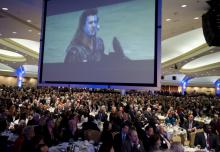Christian

Nuns vs. strippers. Oprah and Hasidim. A Christian TMZ.com? Muslim tweeter is in trouble. Female backlash against the GOP. Catholic television network EWTN files a lawsuit against the contraception mandate. Santorum says the contraception fight has "nothing to do with women's rights." Did Cardinal Bevilacqua die of foul play? A plot to kill the pope. Drive-thru funerals and more...inside the blog.

Whenever possible, I plan my Saturday errands such that I’ll be able catch part of “This American Life” on public radio as I drive and I’ve often found myself sitting in the grocery store parking lot to hear the end of a story.
One recent Saturday, the show’s theme — which ties together each of its non-fiction stories — was the biblical truism that “you reap what you sow” (Galatians 6:7), and most of the program was dedicated to examining the consequences — intended and otherwise — of Alabama’s controversial, toughest-in-the-nation immigration law, HB 56, which passed last June.
Whether what is happening in Alabama as a result of this law — and, as the program reveals, a great deal is happening, even if most of us outside of the state aren’t paying attention — was the intention of the bill’s authors and supporters is not entirely clear. What is clear, from a Christian perspective, is that the effects are devastating.
What most saddened me in the program was the statement of a young undocumented woman named Gabriella that, since the passage of HB 56, she finds herself unwelcome everywhere. “Even in the church,” she says, “you find people that… don't want to talk at you. And they don't want to give the peace to you.”

A letter from Alec Hill, President of InterVarsity Christian Fellowship/USA to Intervarsity Staff
I’m upset.
Last month, the Federal government mandated that Catholic universities, hospitals and charities must provide – and pay for – contraceptives to their employees and students. The mandate may also — depending upon interpretation – include the provision of sterilization services and the morning-after pill. (There appears to be some disagreement amongst scholars regarding the potential scope of the new Health and Human Service mandate.)
Why should I care? I am not Catholic. Nor do I agree with Catholic teaching on contraception, though I do have grave concerns about the morning-after pill.
Politically, I am a moderate and hence not prone to condemn every governmental edict.
I care because this matter touches upon the religious freedom of us all. I care because InterVarsity is engaged in a parallel struggle. Over the past 18 months, our status as a recognized student organization has been challenged on 41 campuses.

A majority of Americans — including Catholics — believe that employers should be required to provide employee health care plans that cover contraception and birth control at no cost, according to a new survey.
But the research by the Public Religion Polling Institute shows that when it comes to providing religious exemptions from free contraceptive coverage – something the White House is sharply criticized for failing to do – the public is much more divided.
The Catholic bishops have slammed the Obama administration in recent weeks, urging priests to read letters from the pulpit blasting a new Health & Human Services rule that will require some Catholic institutions, such as universities, to cover employees' contraceptive costs.
On Monday, the U.S. Conference of Catholic Bishops issued "Six Things Everyone Should Know About the HHS Mandate." Included on the list was, "Catholics of all political persuasions are unified in their opposition to the mandate."
The survey released today, however, paints a more nuanced picture.

I’ll admit I’m a sucker for stories about the malleability of human morality. From the mob movies, where a guy can whack his cousin but better not show his Patron any “disrespect,” to justice-seeking serial killers like “Dexter,” there’s plenty of justified violence to be found.
Where do such seemingly contradictory value systems come from? And do they actually happen in the real world today?
How about the politician who claims a platform that values a respect for “all life,” while justifying war and advocating for capital punishment? Or those who celebrate the death of Osama Bin Laden and Saddam Hussein? And the list goes on.
It’s common in western culture to objectify the Islamic faith, cherry-picking texts from their scripture and plucking choice sound-bytes from extremist leaders, to portray the whole of the religion as inherently violent. This, in turn, is employed to justify violence in-kind, or worse, preemptive violence, as in the case of our invasion of Iraq.
I call this “Dexter” theology.
LONDON — Britain's powerful media advertising watchdog has banned a Christian group from claiming on its website and brochures that God's cure-all powers can heal a string of medical ailments.
The Advertising Standards Authority, the independent regulator of advertising in all British media, ruled that the ads generated by the group Healing on the Streets are irresponsible and misleading.
The ASA, whose tight rules are considered among the world's most stringent, cites a leaflet produced by the group from its center in the spa town of Bath, England, claiming that God "can heal you from any sickness."

Growing up in Kuwait, Asif Balbale thought he wanted to become a chemical engineer. He never imagined enlisting in the U.S. Navy, much less becoming an imam.
Balbale got his engineering degree after immigrating to the U.S. at age 21. With jobs hard to come by, he tried to enlist in the Army, but didn't weigh enough. Instead, he met the Navy's minimum requirements.
He was sworn in as a U.S. citizen in 2005 while deployed aboard the USS Boxer. Intending to apply for an officer program, Balbale, 31, mistakenly emailed a recruiter for the chaplain corps.
"God, I think, had better plans for me," Balbale said, looking back.
And so it is for a number of military chaplains who, by twists of fate or perhaps divine Providence, found their calling to become chaplains while on active duty.
Atlanta-area megachurch pastor Eddie Long has had his share of headlines, many of them not good. Now he's making news — and raising eyebrows — again with a "kingship" ceremony that can only be described as bizarre.
Jewish groups say the ceremony -- in which Long was shrouded by a Torah scroll (allegedly saved from Auschwitz) and then paraded around on a chair — was the height of disrespect. And it's not just Jews who were offended.

Eric James Borges was teased his entire life for being different. Though he didn’t come out publicly until his sophomore year of college, he recalls emotional and physical abuse as far back as kindergarten for his differences. And though most children undergo some degree of hazing from time to time, the seeming indifference of the adults in his life made matters dramatically worse.
In a video recorded for the “It Gets Better” Project, an LGBT advocacy group focused on offering hope and community to LGBT people on the margins, Borges, 19, recalls being physically assaulted in a full high school classroom while his teacher stood by and watched.
The distressed teen had nowhere to turn at home either. His Christian parents decided to perform a ritual exorcism on him with the hope of “curing” him of his orientation. When that failed, they kicked him out of the house.
Though Borges went on to advocate for LGBT rights through the “It Gets Better” Project and his work with The Trevor Project (a group committed to preventing suicide among LGBT teens), the demons of his past still lingered. Despite finding a community that affirmed and embraced who he was, the damage had already been done.
He killed himself on Jan 11.

~ I Sam 16:7 (NRSV)
Now, this may come as a great disappointment to a few Tim Tebow fans out there, but apparently the star quarterback of the Denver Broncos will not, we repeat, will NOT be stripping down to his skivvies for one of those famous (or infamous, depending on your tastes) Jockey undewear ads.
Tebow is the new spokesman for Jockey. But unlike '70s baseball heartthrob Jim Palmer (the relatively hirsute gentleman in the white Jockey briefs to your right) or soccer god (and father of four) David Beckham in his smoldering Emporio Armani undergarment spreads, the quarterback known as much for his Christian faith as his agility on the grid iron will not be posing in his underwear for the, well, underwear company.
President Obama connected his faith with his policies toward the poor at the National Prayer Breakfast on Thursday (2/2/12), a subtle but sharp contrast to remarks made by presidential hopeful Mitt Romney the day before.
"Living by the principle that we are our brother's keeper. Caring for the poor and those in need," Obama said before an audience of about 3,000 at the Washington Hilton. These values, he said, "they're the ones that have defined my own faith journey."
Specifically, Obama said, they translate to policies that support research to fight disease and support foreign aid. His faith, he continued, inspires him "to give up some of the tax breaks that I enjoy."

At this morning's National Prayer Breakfast, President Obama made clear just how pure a postmillennialist Midwestern mainline Protestant he is.
He spoke of how we as individuals acting in community "help bring His kingdom to Earth." And he emphasized the connection between his piety and his public efforts to to make that kingdom a reality.

What does it mean to be a Christian when organizations such as The Family create a Jesus that does not hear the prayers of the poor? An organization that prays to the powerful in place of God? That participates in the global crucifixion of the poor by turning Jesus' cross into a social ladder for politicians to climb upwards, past the broken body of Christ? To cultivate relationships with dictators?
To cultivate the most powerful for political influence, to create an elite society for the elite, is that listening to the prayers of the people?
I ask you, was Jesus a political networker? Did he hobnob with the most powerful? Did he cultivate relationships with the dictators of his time, Herod and Pilate?
Our political class does not hear the prayers of the poor, they hear the "prayers" of corporate lobbyists who fund their campaigns. And they hear the prayers of Christians such as Doug Coe and The Family at the National Prayer Breakfast, because they offer connections, votes, and money.

As someone who self-identifies as an evangelical Christian, often I begin to feel like the subject of a Discovery Channel documentary, particularly in the midst of a heated presidential election cycle.
It’s Evangelical Week here on Discovery! Travel with us as our explorers track the elusive evangelical in its native habitats. Watch as evangelicals worship, work and play, all captured on film with the latest high definition technology. And follow our intrepid documentary team members as they bravely venture into the most dangerous of exotic evangelical locations — the voting booth!
I understand the interest in us evangelicals, I really do. The way much of the mainstream media covers our communities in the news can make us seem like a puzzling subspecies of the American population, not unlike the Rocky Mountain long-haired yeti.
Are we really that difficult to comprehend?
In a word, yes.

It’s hard to remember the warm-up to the Iraq war now almost 10 years old. Following the devastating experience of 9/11 (Sept. 11, 2001), the United States experienced enormous national feelings of anger and sought a means to identify and punish those who were guilty of this horrendous act of terror. We now know that within days, the White House (in particular, the vice president’s office) was pointing a finger at Iraq and within 12 months, any observer could tell that we were on our way to war.
On March 19, 2003, when the invasion began I remember telling a class of students that they ought to remember this day well. It might be a war the U.S. would regret and it might lead to an involvement in the Middle East we don’t know how to end. Now ten years later we’re still mired over there.
What were the reasons for the war? Let’s make a list:

When I talk about myself in relationship to atheists I often sound like a post-civil-rights white person trying to minimize the gap between myself and another group.
I don’t have anything personally against atheists.
Some of my best friends are atheists.
I even like Ricky Gervais. He’s an atheist, you know.
All of this aside, I have tried in vain over the years to understand atheism. I’ve written about it several times, and whenever I do, I get a bucket of responses from atheists.

I know it's late.
I know you are done with the guy and the Broncos' season is over.
Still, I have a question for you.

When I was a kid my summer job was to sell Kool-Aid to people at my mom’s rummage sales, which she and her girlfriends held several times each summer.
I remember overhearing one of mom’s customers complaining, saying something about being able to “Jew down” at our neighbor’s yard sale. I wasn’t sure why but I knew at age six that this kind of talk was very wrong and it was very offensive. Yet I would have thought nothing about hearing someone say that they got “gypped” at a rummage sale, car dealership, or a candy store. In fact it was not for another twelve years before I learned that Gypsies were a race of people with over 1,000,000 people in the US, and 10,000,000 in Europe, making them Europe’s largest ethnic minority.

I’ll admit, I follow a few celebrities on Twitter — especially the writers and actors of my favorite sci-fi shows. If I didn’t love Firefly/Serenity and Chuck, I probably wouldn’t be following Adam Baldwin (@adamsbaldwin). There's something sickly fascinating about reading Baldwin's extreme right-wing hate speech on a regular basis.
I’m still not for sure if his Twitter persona is an extension of his characters or if he simply plays himself in his shows — as his gun-loving Ronald-Reagan-obsessed characters mirror what he posts on Twitter. So whether or not his tweets are caricature or the real deal, they serve as my reminder of the extremes of individualistic nationalism that stands in direct contrast to the ways of the Kingdom of God.
A few days ago, he posted the following Tweet:
anti -American Blog! | RT @washingtonpost "Why do we overlook civilians killed in American wars?" - http://wapo.st/xhLko2 ~ #FreedomIsNotFree
Ed Young and his wife, Lisa, have penned a new book called “Sexperiment: 7 Days to Lasting Intimacy with Your Spouse,” which is a sort of how-to guide for couples to rekindle intimacy in their marriage while remaining within the boundaries of biblical virtues, as interpreted by the authors.
First off, I’m glad evangelicals are joining the sexuality discussion. Having helped create a series of books whose first title was focused on faith and sex/sexuality, I believe it’s of great importance that faith leaders speak in open, healthy ways about sexuality, sexual expression, attraction, and so on.
One of the most hyped points made in the book is that it encourages married couples to engage in their own “Sexperiment,” where they commit to having sex each day for a week. The theory is that this will renew physical and emotional intimacy, and also help reduce the urge for things like pornography.
Hey, sex for Jesus sounds like a no-brainer to me. Sign me up!